Artists are often excessive. Van Gogh’s ear.
Damien Hirst’s diamond skull.
Andy Warhol’s wig.
And then there’s Hollywood.
In 1974 a TV commercial director turned screenwriter called Michael Cimino made his first feature.
The movie Thunderbolt & Lightfoot enjoyed solid box office success.
And his second The Deer Hunter, was not only a massive hit but knocked it right out the park, winning 5 Oscar’s including 1979’s Best Picture and Best Director.
So around this time Michael Cimino was arguably the hottest director in Hollywood.
And for his next project he was able to cut a very favourable deal with United Artists.
One unusual feature of this deal was the absence of a penalty clause for cost overruns, a standard contractual practice enforced by the studios at that time.
The film Cimino wanted to make was close to his heart and he had been trying to make it since 1971.
Then, United Artists had passed on the The Johnson County War as it was called, when it failed to attract any stars.
Now Cimino was a star and Kris Kristofferson, Isabelle Huppert and Christopher Walken, were duly cast as the film’s three main characters.
Heaven’s Gate is an epic tale set in Wyoming of the 1890s it portrays an almost biblical struggle of ranchers against immigrants.
Shooting took place mainly in Montana.
That is when shooting took place - because the production fell behind schedule, pretty much from day one.
There were rumours of rampant drug use by cast and crew.
Cimino became obsessive about the smallest period details and was soon nicknamed “The Ayatollah”.
Actors originally booked for 3 weeks had their bookings extended to six months.
And an original budget of $11.6 million ballooned to $44 million.
By the time production wrapped over 220 hours of film had been shot.
The year before, Superman had cost $55 million making it the most expensive movie ever made.
So a $44 million budget while hardly insignificant was also not completely unprecedented.
However there was one crucial difference between Superman and Heaven’s Gate.
Superman went on to gross $134.21 million in the U.S. alone.
Heaven’s Gate’s U.S. gross was a wretched $1.3 million.
The New York Times review called it, "an unqualified disaster".
And the movie was pulled from theatres after a week.
Now Cimino’s star fell almost as quickly as it had risen.
But much later, imperceptibly, the pendulum began to swing the other way.
Until in 2011 Time Out called Heaven’s Gate one of the best 12 westerns ever made.
In 2012 a 216 minute director’s cut* was shown at the Venice Film Festival to great acclaim.
And in 2013 The New York Times recanted, stating: "The film’s scope, natural backdrops, massive sets, complex choreography and cinematography are seductive, at times stunning".
I think it’s a great film.
And besides, these days $44 million barely buys a decent Warhol.
Or so I'm told.
* You can get this cut on DVD from Criterion






